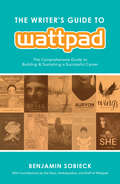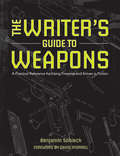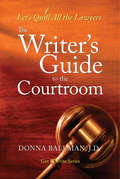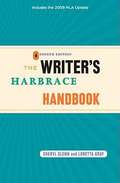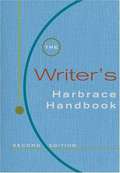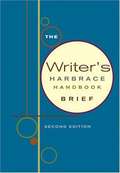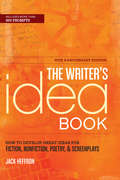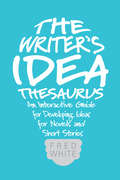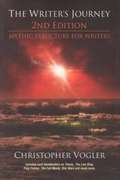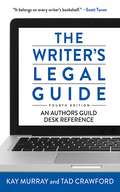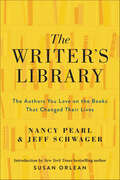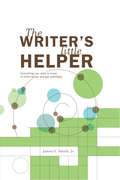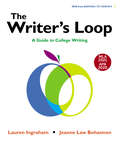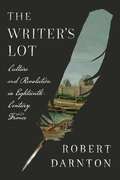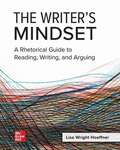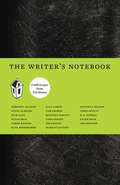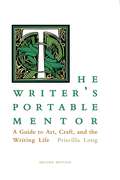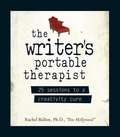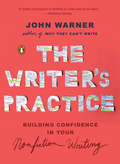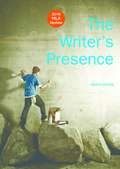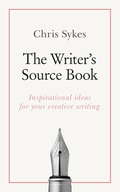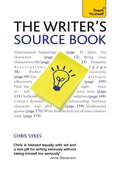- Table View
- List View
The Writer's Guide to Wattpad: The Comprehensive Guide to Building and Sustaining a Successful Career
by Benjamin Sobieck Wattpad WattpadEngage with the Next Generation of Writers! Wattpad is an online storytelling community where users can post their writing, such as articles, stories, novels, fan fiction, and poems. This platform offers writers the chance to connect directly with readers, fans, and story enthusiasts. With the ability to release stories and chapters one at a time, authors can receive continual encouragement and real-time feedback on their work. The Wattpad staff supports successful writers through their Stars program, which provides them opportunities to work with successful brands, publish to print, connect to film and television industries, and more. The potential of Wattpad for writers is limitless, and, for the first-time ever, the staff, writers, and stars of Wattpad have created the guide to help you launch and sustain a successful writing career through this platform. In The Writer's Guide to Wattpad, you'll learn how to:Get started using Wattpad, prepare your writing to be published, and develop a unique cover design.Interact with readers, use multimedia to enhance and tell stories, and leverage social media to create a stronger platform.Attract the attention of an agent or publisher and sell copies of your work elsewhere.Tap into the brand of Wattpad to understand their Stars Program, brand campaigns, and what success looks like.Written to be accessible to beginners and veterans alike, The Writer's Guide to Wattpad is your essential companion to navigating the Wattpad platform and brand, and leveraging your writing to millions of users worldwide.
The Writer's Guide to Weapons: A Practical Reference for Using Firearms and Knives in Fiction
by Benjamin SobieckWhen it comes to writing weapons, most authors shoot from the hip--and miss. The Writer's Guide to Weapons will help you hit your target every time. Firearms and knives have starring roles in a wide range of genres--crime, thriller, war, mystery, Western, and more. Unfortunately, many depictions of weapons in novels and film are pure fiction. Knowing the difference between a shotshell and a slug, a pistol and a revolver, or a switchblade and a butterfly knife is essential for imbuing your story with authenticity--and gaining popularity with discerning readers. Inside you'll find: An in-depth look at the basics of firearms and knives: how they work, why they work, what they look like, and how to depict them accurately in your stories. The biggest weapons myths in fiction, TV, and film. A surefire guide for choosing the correct weapon for your characters, no matter their skill level, strength, or background. A review of major gun and knife laws, weapons safety tips,and common police tactics. "The Hit List," showcasing the most popular weapons for spies, detectives, gunslingers, gangsters, military characters, and more. Examples highlighting inaccurate vs. accurate weapons depictions. An insightful foreword by David Morrell, the award-winning creator of Rambo. Equal parts accessible, humorous, and practical, The Writer's Guide to Weapons is the one resource you need to incorporate firearms and knives into your fiction like a seasoned professional.
The Writer's Guide to the Courtroom
by Donna BallmanOne-stop shopping for researching the complexities of all aspects of civil law. Whether one writes mysteries, romance, mainstream, or nonfiction, if the facts are wrong, the book is ruined. Adding some element of the law is also a valuable asset for adding further dimension or a plot twist to a story.
The Writer's Harbrace Handbook
by Cheryl Glenn Loretta GrayTHE WRITER'S HARBRACE HANDBOOK, 4th Edition, is grounded in the belief that an understanding of the rhetorical situation--the writer, reader, message, context, and exigence (reason for writing)--provides the best starting point for effective writing and reading. This comprehensive handbook guides student writers in employing that rhetorical understanding as they choose the most effective information to include, the best arrangement of that information, and the most appropriate language to use. The text moves students through the steps that constitute successful writing--from finding appropriate topics and writing clear thesis statements to arranging ideas and developing initial drafts. THE WRITER'S HARBRACE HANDBOOK also provides several sample student papers and excerpts of papers in various disciplines, along with instruction for successfully completing similar assignments.
The Writer's Harbrace Handbook (2nd Edition)
by Cheryl Glenn Loretta Gray Suzanne Strobeck Webb Robert Keith MillerThe second edition of this handbook for college students maintains its focus on the rhetorical demands of writing and its emphasis on writing in the disciplines.
The Writer's Harbrace Handbook (Brief 2nd Edition)
by Cheryl Glenn Loretta Gray Robert K. Miller Suzanne Strobeck WebbProviding a reliable standard for writing students and teachers, this text is based on the Harbrace Handbook of English (1941), the perennial college grammar and writing guide that grew from a systematic analysis of errors in some 20,000 college papers. In addition to a cleaner and clearer design, the second edition offers new emphasis on the rhetorical situation; revamped chapters on drafting and revising essays, e-designing, and writing arguments; new chapters on e-writing and evaluating online and print sources; coverage of writing for academic discourse, social and natural sciences, and business; and expanded style guides for researched writing. Annotation (c)2003 Book News, Inc. , Portland, OR (booknews. com)
The Writer's Idea Book: How to Develop Great Ideas for Fiction, Nonfiction, Poetry, and Screenplays
by Jack Heffron"Where do you get your ideas?" It's a question and a quandary that bedevils every writer. And once you've got an idea, what then? Ideas without a plan, without a purpose, are no more than pleasant thoughts. InThe Writer's Idea Book, Jack Heffron, former senior editor at Writer's Digest Books and Story Press, will help you find the answer. Utilizing over 400 prompts and exercises, you'll generate intriguing ideas and plumb their possibilities to turn them into something amazing. The Writer's Idea Bookwill give you the insight and the self-awareness to create and refine ideas that demand to be transformed into greater works, the kind of compelling, absorbing writing that will have other writers asking "wheredoyou get those ideas?"
The Writer's Idea Thesaurus: An Interactive Guide for Developing Ideas for Novels and Short Stories
by Fred WhiteEndless ideas at your fingertips, and at the turn of a page... Need an idea for a short story or novel? Look no further than The Writer's Idea Thesaurus. It's far more than a collection of simple writing prompts. You'll find a vast treasury of story ideas inside, organized by subject, theme, and situation categories, and listed alphabetically for easy reference. Author and award-winning writing instructor Fred White shows you how to build out and customize these ideas to create unique plots that reflect your personal storytelling sensibilities, making The Writer's Idea Thesaurus an invaluable tool for generating creative ideas and vanquishing writer's block--for good. Inside you'll find: 2,000 unique and dynamic story ideas perfect for novels and short stories of any genre or writing style Twenty major idea categories, such as The Invasion of X, The Transformation of X into Y, Escape from X, The Curse of X, and more Multiple situations that further refine the major categories, such as The Creation of Artificial Life, The Descent Into Madness, Love in the Workplace, The Journey to a Forgotten Realm, and more Invaluable advice on how to customize each idea. The Writer's Idea Thesaurus is an interactive story generator that opens the door to thousands of new story arcs and plotlines.
The Writer's Journey, Second Edition: Mythic Structure for Writers
by Christopher VoglerThe Writer's Journey sets forth archetypes common in what Vogler calls "the hero's journey," the mythic structure that he claims all stories follow. In the book's first section, he lists the different kinds of typological characters who appear in stories. In the second, he discusses the stages of the journey through which the hero generally passes. The final, supplementary portion of the book explains in detail how films like Titanic and The Full Monty follow the patterns he has outlined.
The Writer's Legal Guide, Fourth Edition: An Authors Guild Desk Reference
by Tad Crawford Kay MurrayIn an increasingly digitized and complex publishing world, writers need to know how to protect themselves against copyright infringement, legal trouble, and unwise concessions to publishers. Still the author's foremost advocate for copyright protection, fair contracts, and free expression, the Authors Guild has once again partnered with Allworth Press to update this invaluable reference. Thoroughly revised to reflect the many changes in the publishing industry, the fourth edition offers plain-English explanations of legal and business aspects of the trade, from electronic rights and ebooks to contracts and accounting. Other topics include: Registering copyrights, including onlineTaxes and bookkeepingFollowing fair use guidelinesNegotiating contracts with publishers and agentsObtaining permissions to use others' workDealing with periodical, syndication, film, television, play, and audio rights agreementsHandling business disputesUnderstanding libel, privacy, and the limits of free expressionAvoiding self-publishing misstepsPlanning authors' estates
The Writer's Library: The Authors You Love on the Books That Changed Their Lives
by Nancy Pearl Jeff SchwagerNEW & NOTEWORTHY ~ THE NEW YORK TIMES With a Foreword by Susan Orlean, twenty-three of today's living literary legends, including Donna Tartt, Viet Thanh Nguyen, Andrew Sean Greer, Laila Lalami, and Michael Chabon, reveal the books that made them think, brought them joy, and changed their lives in this intimate, moving, and insightful collection from "American's Librarian" and recipient of the National Book Foundation's Literarian Award for Outstanding Service Nancy Pearl and noted playwright Jeff Schwager that celebrates the power of literature and reading to connect us all.Before Jennifer Egan, Louise Erdrich, Luis Alberto Urrea, and Jonathan Lethem became revered authors, they were readers. In this ebullient book, America’s favorite librarian Nancy Pearl and noted-playwright Jeff Schwager interview a diverse range of America's most notable and influential writers about the books that shaped them and inspired them to leave their own literary mark. Illustrated with beautiful line drawings, The Writer’s Library is a revelatory exploration of the studies, libraries, and bookstores of today’s favorite authors—the creative artists whose imagination and sublime talent make America's literary scene the wonderful, dynamic world it is. A love letter to books and a celebration of wordsmiths, The Writer’s Library is a treasure for anyone who has been moved by the written word. The authors in The Writer’s Library are:Russell BanksTC BoyleMichael ChabonSusan ChoiJennifer EganDave EggersLouise ErdrichRichard FordLaurie FrankelAndrew Sean GreerJane HirshfieldSiri HustvedtCharles JohnsonLaila LalamiJonathan LethemDonna TarttMadeline MillerViet Thanh NguyenLuis Alberto UrreaVendela VidaAyelet WaldmanMaaza MengisteAmor Towles
The Writer's Little Helper: Everything You Need to Know to Write Better and Get Published
by James V. SmithBig Fiction Advice from a Little Book There is nothing little about the dynamic fiction-writing advice insideThe Writer's Little Helper. With big ideas, time-saving tips, and revision-made-easy charts, James V. Smith, Jr. offers effective guidance in short, easily checklists, Q&As, and practical tools. This book gives you everything you need to: Create great characters Maintain a compelling pace Craft believable dialogue Expand your creativity Revise your work to perfection Attract agent's and editor's attention And much, much more! The unique format of the book allows you to read from start to finish or to focus just on areas where your fiction needs work. With valuable and surprising tips on every page,The Writer's Little Helperis sure to become your biggest fiction writing aid.
The Writer's Loop with 2020 APA and 2021 MLA Updates
by Lauren Ingraham Jeanne BohannonThis ebook has been updated to provide you with the latest guidance on documenting sources in MLA style and follows the guidelines set forth in the MLA Handbook, 9th edition (April 2021).The Writer’s Loop, presents a refreshing, practical approach to writing, based on the habits of strong writers, who pause often, reflect, and loop backwards and forwards as they revise on their way to a final draft. With integrated videos, relatable examples, clear explanations, and a consistent, scaffolded learning framework, each brief chapter engages writers through reflection and practices that support the most common types of academic writing, including essays, arguments, and research projectsAchieve with Ingraham and Bohannon, The Writer’s Loop combines instruction with integrated videos, powerful writing tools, and customizable multi-draft writing assignments.
The Writer's Lot: Culture and Revolution in Eighteenth-Century France
by Robert DarntonA pioneering social history of French writers during the Age of Revolution, from a world-renowned scholar and National Book Critics Circle Award winner.In eighteenth-century France, writers emerged as a new kind of power. They stirred passions, shaped public opinion, and helped topple the Bourbon monarchy. Whether scribbling in dreary garrets or philosophizing in salons, they exerted so much influence that the state kept them under constant surveillance. A few became celebrities, but most were hacks, and none could survive without patrons or second jobs.The Writer’s Lot is the first book to move beyond individual biography to take the measure of “literary France” as a whole. Historian Robert Darnton parses forgotten letters, manuscripts, police reports, private diaries, and newspapers to show how writers made careers and how they fit into the social order—or didn’t. Reassessing long-standing narratives of the French Revolution, Darnton shows that to be a reject was not necessarily to be a Jacobin: the toilers of the Parisian Grub Street sold their words to revolutionary publishers and government ministers alike. And while literary France contributed to the downfall of the ancien régime, it did so through its example more than its ideals: the contradiction inherent in the Republic of Letters—in theory, open to all; in practice, dominated by a well-connected clique—dramatized the oppressiveness of the French social system.Darnton brings his trademark rigor and investigative eye to the character of literary France, from the culture war that pitted the “decadent” Voltaire against the “radical” Rousseau to struggling scribblers, booksellers, censors, printers, and royal spies. Their lives, little understood until now, afford rare insight into the ferment of French society during the Age of Revolution.
The Writer's Mindset: A Rhetorical Guide to Reading, Writing, and Arguing
by Lisa HoeffnerTo become good writers, students must learn more than a writing process: they must develop a writer’s mindset―the rhetorical skills to read critically, analyze and synthesize sources, and write with their audiences in mind. How can we help students with the challenges involved in thinking like a writer? By using incremental steps that move from literal thinking to analytical and critical understanding, The Writer’s Mindset 1e makes the development of college-level writing capabilities possible for all students, whatever their level of preparedness. <p><p> The Writer’s Mindset provides students with tools to transform the way they approach reading, writing, and arguing through five key pillars: <p> <p>• Rhetorical Focus <p>• Incremental Approach <p>• Embedded Support <p>• Student Appeal <p>• Instructor Support <p><p> The breadth of coverage allows the text to be used in both semesters of Composition, including Composition sections tied to a Co-Requisite or ALP course, which makes this an excellent choice for 2-year schools. It also includes MLA 9e updates. Target opportunities using Everyone’s an Author, Everything’s an Argument, or Writing in the Works.
The Writer's Notebook II
by Francine Prose Christopher BehaThe Writer's Notebook II continues in the tradition of The Writer's Notebook, featuring essays based on craft seminars from the Tin House Summer Writer's Workshop, as well as a variety of craft essays from Tin House magazine contributors and Tin House Books authors. The collection includes essays that not only examine important craft aspects such as humor, suspense, and research but that also explore creating fractured and nonrealist narratives and the role of dream in fiction. An engaging and enlightening read, The Writer's Notebook II is both a toolkit and an inspiration for any writer.
The Writer's Notebook II: Craft Essays from Tin House
by Francine Prose Christopher BehaThe Writer's Notebook II offers aspiring authors sixteen insightful essays about the craft of writing by Tin House authors and summer workshop faculty members, including Aimee Bender, Steve Almond, Maggie Nelson, Karen Russell, Benjamin Percy, and others. The Writer's Notebook II continues in the tradition of The Writer's Notebook, featuring essays based on craft seminars from the Tin House Summer Writer's Workshop, as well as a variety of craft essays from Tin House magazine contributors and Tin House Books authors. The collection includes essays that not only examine important craft aspects such as humor, suspense, and research but that also explore creating fractured and nonrealist narratives and the role of dream in fiction. An engaging and enlightening read, The Writer's Notebook II is both a toolkit and an inspiration for any writer. The Writer's Notebook II offers aspiring authors sixteen insightful essays about the craft of writing by Tin House authors and summer workshop faculty members, including Aimee Bender, Steve Almond, Maggie Nelson, Karen Russell, Benjamin Percy, and others.
The Writer's Notebook II: Craft Essays from Tin House
by Francine Prose Christopher BehaThe Writer's Notebook II offers aspiring authors sixteen insightful essays about the craft of writing by Tin House authors and summer workshop faculty members, including Aimee Bender, Steve Almond, Maggie Nelson, Karen Russell, Benjamin Percy, and others. The Writer's Notebook II continues in the tradition of The Writer's Notebook, featuring essays based on craft seminars from the Tin House Summer Writer's Workshop, as well as a variety of craft essays from Tin House magazine contributors and Tin House Books authors. The collection includes essays that not only examine important craft aspects such as humor, suspense, and research but that also explore creating fractured and nonrealist narratives and the role of dream in fiction. An engaging and enlightening read, The Writer's Notebook II is both a toolkit and an inspiration for any writer. The Writer's Notebook II offers aspiring authors sixteen insightful essays about the craft of writing by Tin House authors and summer workshop faculty members, including Aimee Bender, Steve Almond, Maggie Nelson, Karen Russell, Benjamin Percy, and others.
The Writer's Notebook II: Craft Essays from Tin House
by Francine Prose Christopher BehaThe Writer's Notebook II offers aspiring authors sixteen insightful essays about the craft of writing by Tin House authors and summer workshop faculty members, including Aimee Bender, Steve Almond, Maggie Nelson, Karen Russell, Benjamin Percy, and others. The Writer's Notebook II continues in the tradition of The Writer's Notebook, featuring essays based on craft seminars from the Tin House Summer Writer's Workshop, as well as a variety of craft essays from Tin House magazine contributors and Tin House Books authors. The collection includes essays that not only examine important craft aspects such as humor, suspense, and research but that also explore creating fractured and nonrealist narratives and the role of dream in fiction. An engaging and enlightening read, The Writer's Notebook II is both a toolkit and an inspiration for any writer. The Writer's Notebook II offers aspiring authors sixteen insightful essays about the craft of writing by Tin House authors and summer workshop faculty members, including Aimee Bender, Steve Almond, Maggie Nelson, Karen Russell, Benjamin Percy, and others.
The Writer's Portable Mentor: A Guide to Art, Craft, and the Writing Life, Second Edition
by Priscilla LongDesigned to mentor writers at all levels, from beginning to quite advanced, The Writer&’s Portable Mentor offers a wealth of insight and crafting models from the author&’s twenty-plus years of teaching and creative thought. The book provides tools for structuring a book, story, or essay. It trains writers in observation and in developing a poet&’s ear for sound in prose. It scrutinizes the sentence strategies of the masters and offers advice on how to publish. This second edition is updated to account for changes in the publishing industry and provides hundreds of new craft models to inspire, guide, and develop every writer&’s work.
The Writer's Portable Therapist
by Rachel BallonIn this inspiring, instructive little volume, noted therapist, author, and perfect muse Rachel "Doc Hollywood" Ballon, Ph. D. , sits on your shoulder whispering just the right thing at just the right time. Each chapter is a therapy session tackling a different aspect of the writing life-from conquering "page fright" and the perils/pleasures of solitude to tapping into your subconscious and nurturing the writer within. So, lie down on Dr. Rachel Ballon's couch, and send your creativity-and productivity-soaring! Book jacket.
The Writer's Practice: Building Confidence in Your Nonfiction Writing
by John WarnerFor anyone aiming to improve their skill as a writer, a revolutionary new approach to establishing robust writing practices inside and outside the classroomAfter a decade of teaching writing using the same methods he’d experienced as a student many years before, writer, editor, and educator John Warner realized he could do better. Drawing on his classroom experience and the most persuasive research in contemporary composition studies, he devised an innovative new framework: a step-by-step method that moves the student through a series of writing problems, an organic, bottom-up writing process that exposes and acculturates them to the ways writers work in the world. The time is right for this new and groundbreaking approach. The most popular books on composition take a formalistic view, utilizing “templates” in order to mimic the sorts of rhetorical moves academics make. While this is a valuable element of a writing education, there is room for something that speaks more broadly. The Writer’s Practice invites students and novice writers into an intellectually engaging, active learning process that prepares them for a wider range of academic and real-world writing and allows them to become invested and engaged in their own work.
The Writer's Presence: A Pool of Readings (Eighth Edition)
by Robert Atwan Donald McQuadeThe new edition of The Writer’s Presence collects teachable readings by great writers, showcasing distinctive voices and clear points of view on a broad range of engaging topics.
The Writer's Source Book: Inspirational ideas for your creative writing
by Chris SykesLEARN NEW AND INSPIRING WAYS OF LIFTING YOUR CREATIVE WRITING.Is your creative writing in need of inspiration? Do you need confidence to create watertight plots and believable characters?The Writer's Source Book provides dozens of practical exercises to help you create storylines, craft people and generate ideas, with support and creative insight for every stage.It will give you support in identifying your genre and crafting your work around it, and help you to understand the complexities of plot and character before beginning to create your own.Inspired and inspiring exercises will help you master the structure of your book, story or play, while focused and innovative advise will help those who have run into trouble. This is a technical manual ideal for any writer who needs to build, fix, polish or perfect their storyline.ABOUT THE SERIESThe Teach Yourself Creative Writing series helps aspiring authors tell their story. Covering a range of genres from science fiction and romantic novels, to illustrated children's books and comedy, this series is packed with advice, exercises and tips for unlocking creativity and improving your writing. And because we know how daunting the blank page can be, we set up the Just Write online community at tyjustwrite, for budding authors and successful writers to connect and share.
The Writer's Source Book: Teach Yourself
by Chris SykesIs your creative writing in need of inspiration? Do you need confidence to create watertight plots and believable characters?The Writer's Source Book provides dozens of practical exercises to help you create storylines, craft people and generate ideas, with support and creative insight for every stage.It will give you support in identifying your genre and crafting your work around it, and help you to understand the complexities of plot and character before beginning to create your own.Inspired and inspiring exercises will help you master the structure of your book, story or play, while focused and innovative advise will help those who have run into trouble. This is a technical manual ideal for any writer who needs to build, fix, polish or perfect their storyline.
